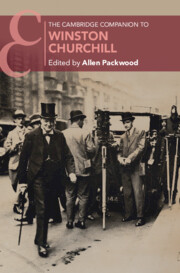Book contents
- The Cambridge Companion to Winston Churchill
- The Cambridge Companion to Winston Churchill
- Copyright page
- Contents
- Figures
- Contributors
- Foreword
- Acknowledgements
- Abbreviations
- Introduction
- 1 Churchill’s Contested History
- 2 The Inheritance of Winston Churchill
- 3 Learning Lessons
- 4 Churchill As a Writer and Orator
- 5 Churchill and Social Policy
- 6 Churchill, the ‘Irish Question’ and the Irish
- 7 Churchill’s First World War
- 8 Churchill, Art and Politics
- 9 Churchill’s Economics
- 10 Churchill, the Roosevelts and Empire
- 11 Churchill, India and Race
- 12 Churchill’s Campaign against Appeasement
- 13 Churchill As War Leader
- 14 Churchill, The English-Speaking Peoples and the ‘Special Relationship’
- 15 Churchill As International Statesman
- 16 Churchill and the Bombing Campaign
- 17 The Influence of Clementine Churchill
- 18 Churchill and the ‘United States of Europe’
- 19 Indian Summer or Conservative Winter?
- Conclusion
- Book part
- Index
- References
12 - Churchill’s Campaign against Appeasement
Published online by Cambridge University Press: 19 January 2023
- The Cambridge Companion to Winston Churchill
- The Cambridge Companion to Winston Churchill
- Copyright page
- Contents
- Figures
- Contributors
- Foreword
- Acknowledgements
- Abbreviations
- Introduction
- 1 Churchill’s Contested History
- 2 The Inheritance of Winston Churchill
- 3 Learning Lessons
- 4 Churchill As a Writer and Orator
- 5 Churchill and Social Policy
- 6 Churchill, the ‘Irish Question’ and the Irish
- 7 Churchill’s First World War
- 8 Churchill, Art and Politics
- 9 Churchill’s Economics
- 10 Churchill, the Roosevelts and Empire
- 11 Churchill, India and Race
- 12 Churchill’s Campaign against Appeasement
- 13 Churchill As War Leader
- 14 Churchill, The English-Speaking Peoples and the ‘Special Relationship’
- 15 Churchill As International Statesman
- 16 Churchill and the Bombing Campaign
- 17 The Influence of Clementine Churchill
- 18 Churchill and the ‘United States of Europe’
- 19 Indian Summer or Conservative Winter?
- Conclusion
- Book part
- Index
- References
Summary
For much of the decade prior to 1940, Churchill was out of office and often seen as a warmonger. He saw appeasement as a policy not befitting a country of Britain’s standing that failed to take account of innate German militarism. One of his most effective tactics in opposing it was his evocative use of history, drawing parallels between his own life and that of his eighteenth-century ancestor, the 1st Duke of Marlborough. To Churchill, the British government’s dealings with Gandhi and the Congress Party were also a form of appeasement. There was a paradox in his thinking; that the forms of nationalism that bolstered British international power were legitimate, while those that did not were not. Churchill’s opposition to Hitler was based on his own first-hand experiences while researching his Marlborough biography and on his reading of the German ‘mental map’. The chapter traces his evolving response from the German occupation of the Rhineland in 1936 through to the Munich Crisis of 1938 and beyond. It ends by analysing Churchill’s path to power as prime minister, suggesting that far from being a triumph of opportunity, there were simply no other suitable candidates for the post.
Keywords
- Type
- Chapter
- Information
- The Cambridge Companion to Winston Churchill , pp. 224 - 243Publisher: Cambridge University PressPrint publication year: 2023

